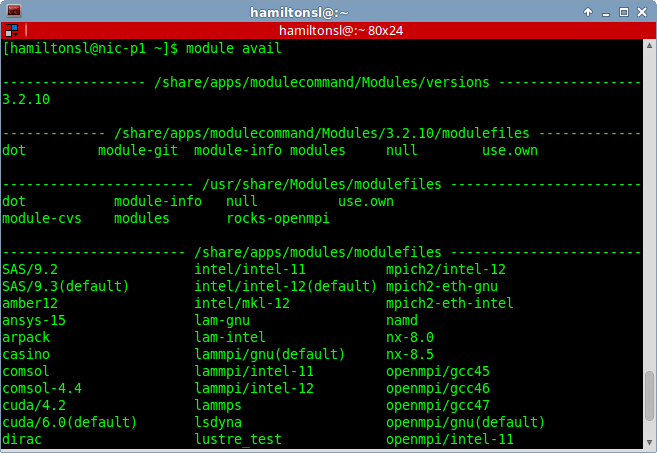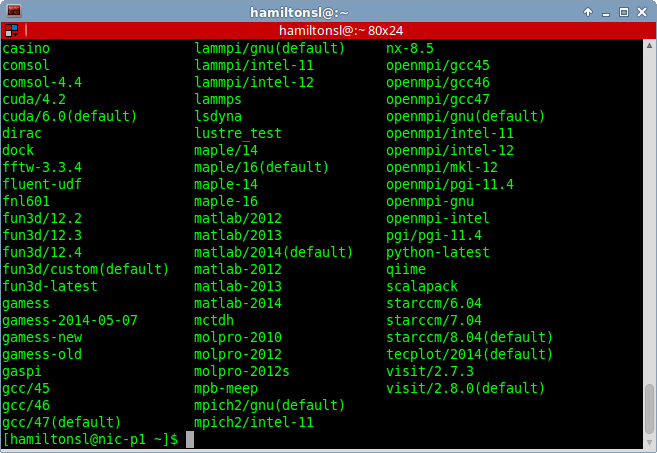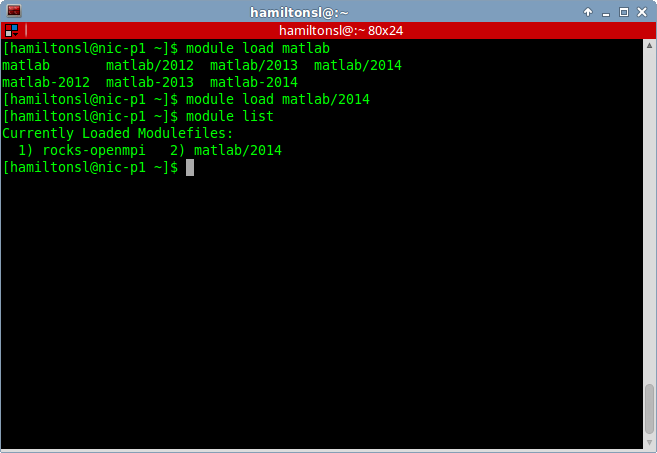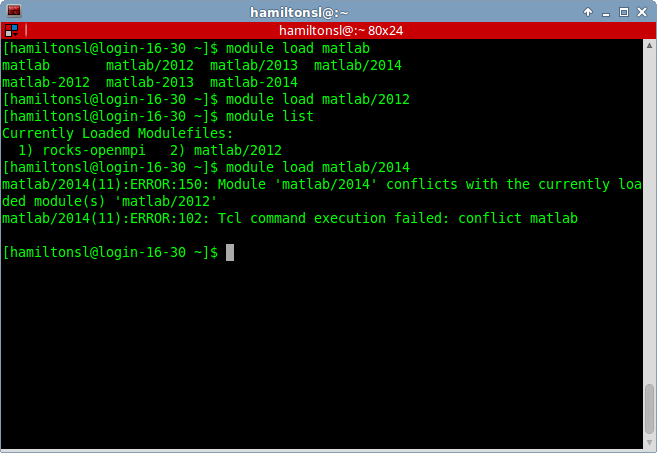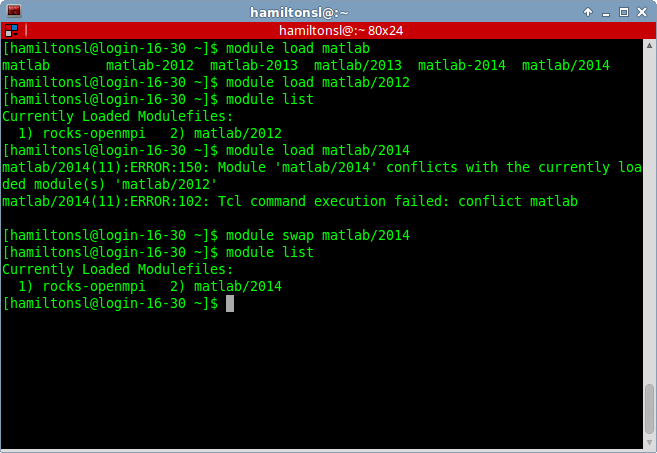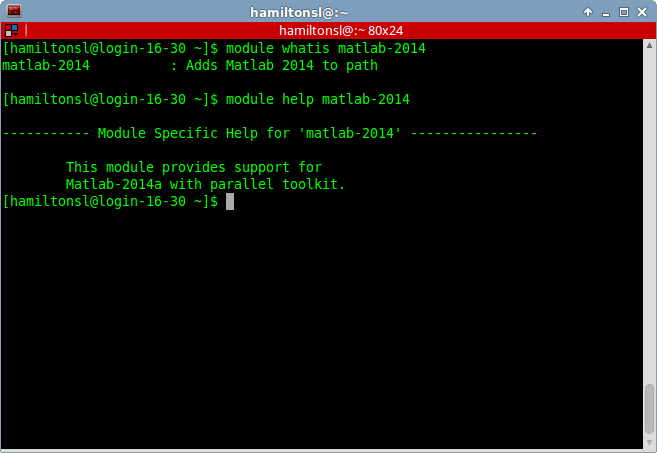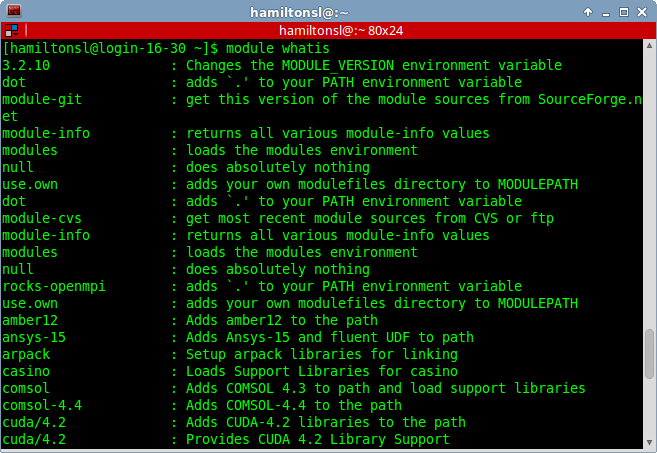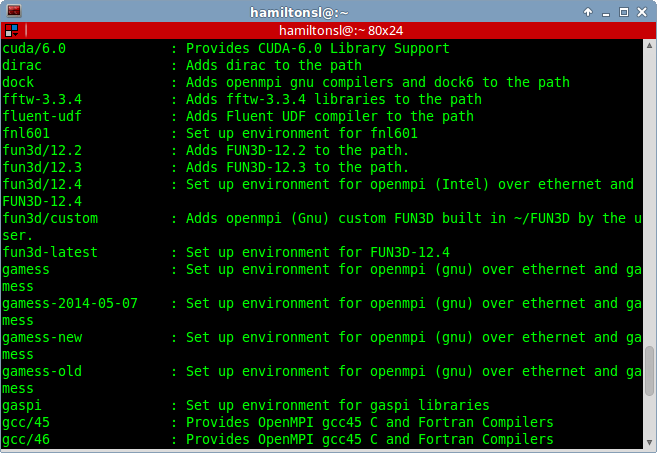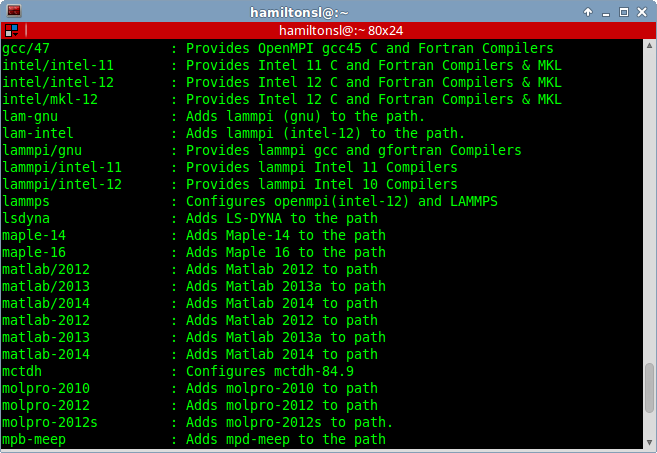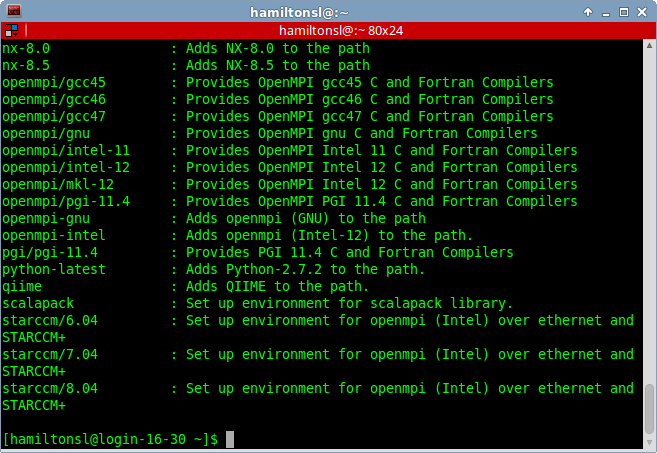Environment Modules
The Environment Modules package provides for the dynamic modification of a user's environment via modulefiles.
Each modulefile contains the information needed to configure the shell for an application. Once the Modules package is initialized, the environment can be modified on a per-module basis using the module command which interprets modulefiles. Typically modulefiles instruct the module command to alter or set shell environment variables such as PATH, MANPATH, etc. modulefiles may be shared by many users on a system and users may have their own collection to supplement or replace the shared modulefiles.
Modules can be loaded and unloaded dynamically and atomically, in a clean fashion. All popular shells are supported, including bash, ksh, zsh, sh, csh, tcsh, as well as some scripting languages such as perl and python.
Modules are useful in managing different versions of applications. Modules can also be bundled into metamodules that will load an entire suite of different applications.
For more information see the Forge Wiki.
Usage of Environment Modules
savemodules will save your currently loaded set of modules for all future logins.
unsavemodules will clear the saved modules so that they will not load on next login.
module [switches] [sub-command] [sub-command-args]
module is a user interface to the Modules package. The Modules package provides for the dynamic modification of the user's environment via modulefiles.
Each modulefile contains the information needed to configure the shell for an application. Once the Modules package is initialized, the environment can be modified on a per-module basis using the module command which interprets modulefiles. Typically modulefiles instruct the module command to alter or set shell environment variables such as PATH, MANPATH, etc. modulefiles may be shared by many users on a system and users may have their own collection to supplement or replace the shared modulefiles.
The modulefiles are added to and removed from the current environment by the user. The environment changes contained in a modulefile can be summarized through the module command as well. If no arguments are given, a summary of the module usage and sub-commands are shown.
The action for the module command to take is described by the sub-command and its associated arguments.
Command line switches
The module command accepts command line switches as its first parameter. These may be used to control output format of all information displayed and the module behavior in case of locating and interpreting module files.
All switches may be entered either in short or long notation. The following switches are accepted:
- --help, -H
- Give some helpful usage information, and terminates the command.
- --version, -V
- Lists the current version of the module command, and some configured option values. The command then terminates without further processing.
- --force, -f
- Force active dependency resolution. This will result in modules found on a prereq command inside a module file being load automatically. Unloading module files using this switch will result in all required modules which have been loaded automatically using the -fswitch being unload. This switch is experimental at the moment.
- --terse, -t
- Display avail and listoutput in short format.
- --long, -l
- Display avail and listoutput in long format.
- --human, -h
- Display short output of the avail and listcommands in human readable format.
- --verbose, -v
- Enable verbose messages during module command execution.
- --silent, -s
- Disable verbose messages. Redirect stderr to /dev/null if stderr is found not to be a tty. This is a useful option for module commands being written into .cshrc, .login or .profile files, because some remote shells (as rsh(1)) and remote execution commands (like rdist) get confused if there is output on stderr.
- --create, -c
- Create caches for module avail and module apropos. You must be granted write access to the ${MODULEHOME}/modulefiles/ directory if you try to invoke module with the -coption.
- --icase, -i
- Case insensitive module parameter evaluation. Currently only implemented for the module aproposcommand.
- --userlvl <lvl>, -u <lvl>
- Set the user level to the specified value. The argument of this option may be one of:
novice, nov Novice
expert, exp Experienced module user
advanced, adv Advanced module user
Module Sub-Commands
- help [modulefile...]
- Print the usage of each sub-command. If an argument is given, print the Module-specific help information for the modulefile(s).
- add modulefile...
- load modulefile...
- Load modulefile(s) into the shell environment.
- rm modulefile...
- unload modulefile...
- Remove modulefile(s) from the shell environment.
- swap [modulefile1] modulefile2
- switch [modulefile1] modulefile2
- Switch loaded modulefile1 with modulefile2. If modulefile1 is not specified, then it is assumed to be the currently loaded module with the same root name as modulefile2.
- show modulefile...
- display modulefile...
- Display information about one or more modulefiles. The display sub-command will list the full path of the modulefile(s) and all (or most) of the environment changes the modulefile(s) will make if loaded. (It will not display any environment changes found within conditional statements.)
- list
- List loaded modules.
- avail [path...]
- List all available modulefiles in the current MODULEPATH. All directories in the MODULEPATH are recursively searched for files containing the modulefile magic cookie. If an argument is given, then each directory in the MODULEPATH is searched for modulefiles whose pathname match the argument. Multiple versions of an application can be supported by creating a subdirectory for the application containing modulefiles for each version.
- use [-a|--append] directory...
- Prepend one or more directories to the MODULEPATH environment variable. The --append flag will append the directory to MODULEPATH.
- unuse directory...
- Remove one or more directories from the MODULEPATH environment variable.
- update
- Attempt to reload all loaded modulefiles. The environment will be reconfigured to match the environment saved in ${HOME}/.modulesbeginenv (if BEGINENV=1) or the file pointed at by $MODULESBEGINEV (if BEGINENV=99) and the modulefiles will be reloaded. This is only valid if modules was configured with --enable-beginenv (which defines BEGINENV), otherwise this will cause a warning. update will only change the environment variables that the modulefiles set.
- clear
- Force the Modules package to believe that no modules are currently loaded.
- purge
- Unload all loaded modulefiles.
- refresh
- Force a refresh of all non-persistent components of currently loaded modules. This should be used on derived shells where aliases need to be reinitialized but the environment variables have already been set by the currently loaded modules.
- whatis [modulefile...]
- Display the information set up by the module-whatis commands inside the specified modulefile(s). If no modulefile is specified, all 'whatis' lines will be shown.
- apropos string
- keyword string
- Seeks through the 'whatis' informations of all modulefiles for the specified string. All module-whatis informations matching the string will be displayed.
- initadd modulefile...
- Add modulefile(s) to the shell's initialization file in the user's home directory. The startup files checked (in order) are:
csh - .modules, .cshrc(.ext), .csh_variables, and .login(.ext)
tcsh - .modules, .tcshrc, .cshrc(.ext), .csh_variables, and .login(.ext)
sh and ksh - .modules, .profile(.ext), and .kshenv(.ext)
bash - .modules, .bash_profile, .bash_login, .profile(.ext), and .bashrc(.ext)
zsh - .modules, .zcshrc(.ext), .zshenv(.ext), and .zlogin(.ext)If a 'module load' line is found in any of these files, the modulefile(s) is(are) appended to any existing list of modulefiles. The 'module load' line must be located in at least one of the files listed above for any of the 'init' sub-commands to work properly. If the 'module load' line is found in multiple shell initialization files, all of the lines are changed.
- initprepend modulefile [modulefile...]
- Does the same as initadd but prepends the given modules to the beginning of the list.
- initrm modulefile...
- Remove modulefile(s) from the shell's initialization files.
- initswitch modulefile1 modulefile2
- Switch modulefile1 with modulefile2 in the shell's initialization files.
- initlist
- List all of the modulefiles loaded from the shell's initialization file.
- initclear
- Clear all of the modulefiles from the shell's initialization files.
Available Modules
Notice the modules on the cluster are always being updated, so the list here may not always be the most recent. You can get the most recent list by running the "module avail" command on the cluster.
| Module | Description |
| dot | adds `.' to your PATH environment variable |
| module-cvs | get most recent module sources from CVS or ftp |
| module-info | returns all various module-info values |
| modules | loads the modules environment |
| null | does absolutely nothing |
| rocks-openmpi | adds `.' to your PATH environment variable |
| use.own | adds your own modulefiles directory to MODULEPATH |
| amber12 | Adds amber12 to the path |
| ansys-15 | Adds Ansys-15 and fluent UDF to path |
| arpack | Setup arpack libraries for linking |
| casino | Loads Support Libraries for casino |
| comsol | Adds COMSOL 4.3 to path and load support libraries |
| comsol-4.4 | Adds COMSOL-4.4 to the path |
| cuda/4.2 | Adds CUDA-4.2 libraries to the path |
| cuda/4.2 | Provides CUDA 4.2 Library Support |
| cuda/6.0 | Provides CUDA-6.0 Library Support |
| dirac | Adds dirac to the path |
| dock | Adds openmpi gnu compilers and dock6 to the path |
| fftw-3.3.4 | Adds fftw-3.3.4 libraries to the path |
| fluent-udf | Adds Fluent UDF compiler to the path |
| fnl601 | Set up environment for fnl601 |
| gamess | Set up environment for openmpi (gnu) over ethernet and gamess |
| gamess-2014-05-07 | Set up environment for openmpi (gnu) over ethernet and gamess |
| gamess-new | Set up environment for openmpi (gnu) over ethernet and gamess |
| gamess-old | Set up environment for openmpi (gnu) over ethernet and gamess |
| gaspi | Set up environment for gaspi libraries |
| gcc/45 | Provides OpenMPI gcc45 C and Fortran Compilers |
| gcc/46 | Provides OpenMPI gcc45 C and Fortran Compilers |
| gcc/47 | Provides OpenMPI gcc45 C and Fortran Compilers |
| intel/intel-11 | Provides Intel 11 C and Fortran Compilers & MKL |
| intel/intel-12 | Provides Intel 12 C and Fortran Compilers & MKL |
| intel/mkl-12 | Provides Intel 12 C and Fortran Compilers & MKL |
| lam-gnu | Adds lammpi (gnu) to the path. |
| lam-intel | Adds lammpi (intel-12) to the path. |
| lammpi/gnu | Provides lammpi gcc and gfortran Compilers |
| lammpi/intel-11 | Provides lammpi Intel 11 Compilers |
| lammpi/intel-12 | Provides lammpi Intel 10 Compilers |
| lammps | Configures openmpi(intel-12) and LAMMPS |
| lsdyna | Adds LS-DYNA to the path |
| maple-14 | Adds Maple-14 to the path |
| maple-16 | Adds Maple 16 to the path |
| matlab-2012 | Adds matlab 2012a to the path |
| matlab-2013 | Adds Matlab-2013a to the path |
| matlab-2014 | Adds Matlab 2014a to the path. |
| matlab/2014 | Adds Matlab 2014a to the path. |
| matlab/2013 | Adds Matlab-2013a to the path |
| matlab/2012 | Adds matlab 2012a to the path |
| mctdh | Configures mctdh-84.9 |
| molpro-2010 | Adds molpro-2010 to path |
| molpro-2012 | Adds molpro-2012 to path |
| molpro-2012s | Adds molpro-2012s to path. |
| mpb-meep | Adds mpd-meep to the path |
| mpich2/gnu | Provides mpich2 gcc and gfortran Compilers |
| mpich2/intel-11 | Provides mpich2 Intel 11 Compilers |
| mpich2/intel-12 | Provides mpich2 Intel 12 Compilers |
| mpich2-eth-gnu | Adds mpich2 (gnu) to the path. |
| mpich2-eth-intel | Adds mpich2 (Intel-12) to the path |
| namd | Adds namd to the path |
| nx-8.0 | Adds NX-8.0 to the path |
| nx-8.5 | Adds NX-8.5 to the path |
| openmpi/gcc45 | Provides OpenMPI gcc45 C and Fortran Compilers |
| openmpi/gcc46 | Provides OpenMPI gcc46 C and Fortran Compilers |
| openmpi/gcc47 | Provides OpenMPI gcc47 C and Fortran Compilers |
| openmpi/gnu | Provides OpenMPI gnu C and Fortran Compilers |
| openmpi/intel-11 | Provides OpenMPI Intel 11 C and Fortran Compilers |
| openmpi/intel-12 | Provides OpenMPI Intel 12 C and Fortran Compilers |
| openmpi/mkl-12 | Provides OpenMPI Intel 12 C and Fortran Compilers |
| openmpi/pgi-11.4 | Provides OpenMPI PGI 11.4 C and Fortran Compilers |
| openmpi-gnu | Adds openmpi (GNU) to the path |
| openmpi-intel | Adds openmpi (Intel-12) to the path. |
| pgi/pgi-11.4 | Provides PGI 11.4 C and Fortran Compilers |
| python-latest | Adds Python-2.7.2 to the path. |
| qiime | Adds QIIME to the path. |
| scalapack | Set up environment for scalapack library. |
| starccm/6.04 | Set up environment for openmpi (Intel) over ethernet and STARCCM+ |
| starccm/7.04 | Set up environment for openmpi (Intel) over ethernet and STARCCM+ |
| starccm/8.04 | Set up environment for openmpi (Intel) over ethernet and STARCCM+ |

